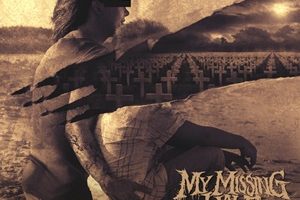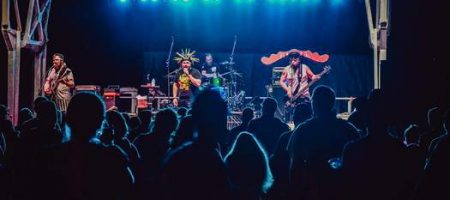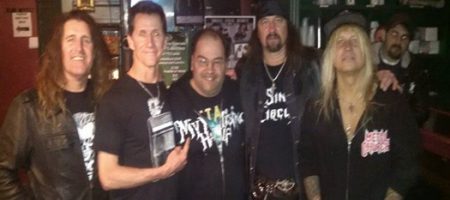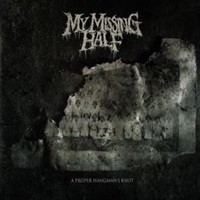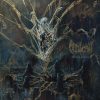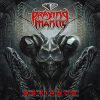My Missing Half – Revel in Decay
Tuesday, 28th July 2020
It’s been an uphill battle establishing themselves as a potent melodic death metal force beyond the confines of the New England scene – but My Missing Half are a band with multiple DIY tours under their belt across the USA and Canada. Their persistence and commitment to delivering quality live performances matches the intensity and potency of their records – of which their latest Ceaseless Decay probably sets the bar even higher than ever before when it comes to stronger hooks, melodies, and overall memorable songs.
Feeling the need to reach out to vocalist/guitarist Bijan Hennessey and fellow guitarist Nick Petrino, you’ll learn the challenges behind self-recording and the obstacles that caused the four-year gap between releases, what they’ve learned through the process – the ever-changing groups that come up in the New England metal scene, plus frank talk about the importance of performances and Nick’s learning curve as he joined the Dee Snider solo band.
Dead Rhetoric: Ceaseless Decay is the latest My Missing Half album – hitting the market four years after your last EP A Proper Hangman’s Knot. Would you like to discuss the many trials and tribulations that took place with this recording – because I remember hearing stories of retrieving missing files, computer hard drives crashing, plus I believe there was the timing of Nick’s joining Dee Snider’s band that came into play?
Bijan: Oh god, where do we even start? If we go back I remember going into record the drums, in Jay Maas’ studio – get the drums done, spend a month at home, and track guitars, bass, and vocals, and a month later the record was going to be done. And then years went by.
Nick: It was crazy. We spent time writing a lot of the stuff and putting a lot of it together. Structurally we put a lot of it together before we put a lot of the specific parts of the music together. Just so we could get in and have Eric lay down a solid foundation, and we could work individually on it as we did a lot of recording on our own guitar, bass and vocals, just to see if we could save some time and money. We all have different levels of experience with that home recording stuff. This was us coming together and filling in the blanks for each other, but in turn taking so much time to do any of it. It wound up being very counterproductive a lot of the time.
Bijan: In many ways I’m glad we did it, but I wish the band’s first attempt at doing this was with the previous record. Or maybe not even, I like how everything has turned out so far. I’m just glad it’s over with. Everything could go wrong – multiple computer crashes, it wasn’t just my computer, our producer had a hard drive problem. It’s a record’s curse.
Nick: And this was after I got pulled away for all the Dee stuff…
Bijan: And I had a family reunion in the middle of it, and they would ask how my band is and I said, I don’t know (laughs). This might be the best thing that’s ever happened, or I don’t have a band. I don’t know. We had no idea when the record’s coming out – should be two weeks but I had been saying that for over a year. When you asked this question, immediately my brain had to think about the record now being out. It’s assumed the spot of being, trying to finish this thing is part of my identity now. Since it was the first time we had done a record like this, it couldn’t have been worse. It has to be at least as good as the previous ones, and make sure it’s professional. It sets you up to second guess every little take you do. You do a retake 500 times, and over the course of doing this you find out take 500 is infinitely worse than take 25.
Dead Rhetoric: So you see the self-recording as a blessing and a curse – because it was hard for you to say where the best takes were and just say enough was enough to finish it?
Nick: I had done enough of these projects before My Missing Half to sort of know that and have that in my head. You need to focus on this from the outside. But I think Bijan was a little more caught up in that, and had to… I was pulling him away from something he was screaming and fighting inside to stay attached to.
Bijan: If you hadn’t done that, it still wouldn’t be out. In many ways I would have still been working on it. I did an extra month of vocal takes, because I didn’t think they were good enough. Jay would compare them and couldn’t tell which was better. We had to get this out, so it’s done. I’m only making it better for myself, it’s not having any effect on anyone else.
Dead Rhetoric: You placed a greater emphasis on the right details for main hooks, melodies, and harmonies on these songs. Where do you see this album slotting in the My Missing Half catalog, and where do you see the band’s progression in terms of performances and abilities as a melodic death metal/extreme band?
Nick: In the catalog of stuff, I feel like every release from the oldest to the most current has a real noticeable progression of better songwriting, better playing, maybe more focused, more thought out and more planned. Having joined this band right when the last record came out, the A Proper Hangman’s Knot EP – I didn’t have a chance to write on that but I took enough about what the band is about and what they sound like to learn how to be in that style over the last few years. I could tune into that part of my brain when writing for this record. On top of that, Bijan is always trying to move forward and keep climbing to the next level with whatever resources and players he has with them. This lineup has always had an emphasis on strong choruses, big, catchy guitar hooks, we took that and brought it up. We wanted this album to be focused on those kinds of things, and really easy to jump into. We thought of this as metalheads who may want to write a pop record, more or less.
Bijan: This is my opinion, but I think this is the best record we’ve ever done. Most of this record, each individual song is the best this band has ever done. We are going after a lot more pop or bands closer to a poppier genre.
Nick: Whether it’s the melodies that were being sung or the melodies the lead guitar would be playing under the choruses, a lot of that came from emo and punk music, or more commercial rock that people our age listened to when we were younger. There’s almost this sense of familiarity that people my age are hearing, a lot of those bands were a lot more radio friendly.
Bijan: Maybe it’s a sign of maturity, or a sign of apathy, we included a type of influence that might not have been the most true metal way to go about things. We like what we listen to, who are we really trying to impress? A lot of metalheads especially, for whatever reason, at our age pretend that they didn’t own The Black Parade from My Chemical Romance when they were 14, or picked up The Poison from Bullet for My Valentine because those were not cool records to have. You have to talk about At the Gates, which we also owned, but you can’t draw influence from these albums that were nostalgic.
Dead Rhetoric: Can you discuss the cover art concepts you developed for not only Ceaseless Decay but the singles “Before Waves and Rocks Catch Me” and “Make it Quick”?
Bijan: Part of me wants to keep this as a giant secret (laughs). We got very, very lucky in that we were looking for an artist to do this, because the guy who did the previous EP artwork was unavailable. This cover as is was for sale by Pierre-Alain D from 3mmi Design. That was perfect and it fit the theme. The other artwork that we used for the singles was part of a package, I couldn’t believe it was all just there. We had to go for it, it had a perfect life and death limbo half theme that we go for. It hits you in the feels, which is what we try to do as opposed to being as brutal as possible. An album cover that would work for Cannibal Corpse wouldn’t work for us, and we wouldn’t want to have a record cover that Simple Plan would have either. This was right there, and we got really lucky.
Dead Rhetoric: How has the band been handling these pandemic driven times – as you had to cancel your tour to push the record? I’ve seen through your social media that you’ve been devoting a lot of time to video game competitions and posting some of these gaming sessions live and getting other friends involved…
Nick: We actually had three tours – two of them were unannounced – in support of this record cancelled. It was a real bummer, especially for the ones that were unannounced, because we did all the work and nobody gets to see that. It’s really made us realize how much the band over the last several years we’ve really become mostly a live band. We are writing these songs, putting them out, putting media out, but most of what we do feeds into our live show and touring and playing. It’s weird to not have that, and we are still trying to find our place. We’ve been upping our online content in general – Bijan has been doing a lot of video editing. Coincidentally we took a camera and took a lot of footage together on the road. We didn’t know where it was going to go – you build vlogs and video content. We can continue releasing that stuff and use it as promotional material for the record. So that’s a lot of what we’ve been doing.
The streaming thing, hanging out and doing things a little different. We can’t play live shows, but we can show ourselves in a different way.
Bijan: That was more of like we were putting out the record despite the tour not happening. We wanted to have some sort of celebration for the record, despite how goofy it was. We decided to go live on Facebook playing Pokemon. A lot of the online video content, we had planned on doing it from the beginning of the year. We like the cool, dark creepy videos to make it look like a professional music video. But we can’t put that content out all the time. I’m very glad even though we got a month’s worth of shows, we’ve been able to release stuff through this.
Nick: Our PR company Marauder made a good point. We have kind of this tongue in cheek kind of sense of humor as people, despite the music having such a bleak theme. They wanted us to show that (side) a little more. The more videos we’ve done, the more we can show that, and be a little more humorous and a lot of people are picking up on that. It makes these videos go over a lot better and promote our release if we didn’t have this stuff.
Dead Rhetoric: What excites you currently within the extreme or melodic death genres as far as bands and albums? Do you believe you gain inspiration from outside the box sources outside of the metal genre to use as fuel when tackling your own abilities on the guitar and writing compositions?
Nick: In terms of stuff in our own genre, not a whole lot. I’m not up to date on a ton of stuff that goes on, mostly because the majority of time I spend listening to music is when I’m driving. I just listen to old stuff that I know, or the radio with a lot of pop, R+B, hip hop. Totally different stuff. I don’t listen to metal very much because I’m around it so often that I need a cleanse. Anything from like hair metal to 2000’s emo music. When it comes to playing and practicing, I take influence from classic heavy metal, thrash, shred, or other genres. In terms of modern metal, a lot of it is derived from the stuff I’m listening to anyway, I get inspiration from the old stuff I’ve listened to for years.
Bijan: I don’t know what it was about this record, it did some serious damage to the part of my brain that enjoys music. I still love it, but I had a lot of trouble since finishing it to find new albums to get excited about. Maybe it’s the beginning of the old man years starting to set in, that’s not true but when I take the time to dive into a big metal release that comes out, I almost always end up loving it. I’m not driving as much as I used to, or shows that are eight hours away, I’m not keeping up with the new releases. My Spotify weekly recommendations has been atmospheric black metal djent music for the last three and a half years. That stuff’s cool, but when I look for new stuff, that’s what it tells me to listen to. Maybe I need to go scouring for some new melodic death metal.
Dead Rhetoric: How would you assess the career of My Missing Half to date? Would you say you’ve been able to establish a firm foothold across New England and developing inroads into other scenes across North America through your touring excursions?
Nick: I don’t think anybody has really established a strong foothold. This scene in New England especially, it seems to have changed so much. Bands that have been around for some time, a couple of years or more – they’ll gig a lot in the beginning, do a record, then dip down and have these waves of activity. We do that as well. We get a good enough response, a lot of people who know us, a lot who don’t. It goes for a lot of places. We have a lot of people who do remember us when we play across the country, it’s the same kind of deal. Unfortunately we can’t get to those places as frequently as we want to because of the time, the planning, and the money involved in touring. Even just to see these people more often and be a part of their scenes more often. Being present and relevant to those people.
With those waves of inactivity, during those times you get younger people that are coming up and playing for a whole year, a brand new band that is trying to get their feet dirty. There’s a growing younger scene, and we are getting older. Maybe this happens to everybody.
Bijan: We have a good foothold in the New England area, but as a result if we want to have a good turnout… we can’t have it to be a not so flattering lineup at a not so awesome venue (laughs). You know what I mean? If we are playing with bands that most humans would not want to listen to in a venue that most people would prefer not to go to, it’s very difficult to pull someone out for the tenth or twentieth time. We’ve established a reputation to get people out to every show when we are coming from far away, but what’s interesting is that we will play the same city twice in six months or maybe further away, once a year and we will go back and it will be those number of devout people that come out, and some new people. The Friday and Saturday attendees at venues seems to be changing pretty rapidly too. It could be a cultural shift in attendance.
Pages: 1 2











